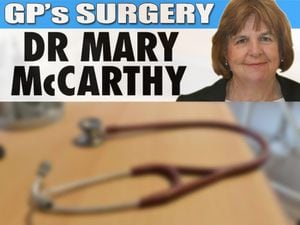Dr Mary McCarthy: When you try to do more with less, something has to give
The British Social Attitudes survey has been going since 1983 and is therefore a useful guide in monitoring long-term trends, writes Dr Mary McCarthy.

It questioned 3,000 people in England, Scotland and Wales on what they thought of the NHS and asked a third of these about their experiences of particular services.
Given the current crisis in the NHS and years of under-investment, the results of the survey were disappointing but not entirely unexpected.
Satisfaction with the NHS as a whole has dropped to 57 per cent, with general practice in particular experiencing a significant drop in the public’s satisfaction of the service.
General practice has long been regarded, as the “jewel in the crown” of the NHS owing to the accessible and familiar service it provides to people on a local level.
Without general practice the NHS would not function; acting as clinical filter for the rest of the NHS, and indeed the first point of contact for many people. As well as medical problems, patients visit their family doctor to discuss social issues and mental health concerns. Indeed, the relationship between the GP and the patient is fundamental to its success.
They control and manage day to day presentations, organise pathways of care, act as the patient’s advocate and refer to secondary care if necessary.
Only about one in twenty of the daily consultations are referred on for further investigation or treatment, so imagine the demand on secondary care if, instead of one patient referred, twenty patients turned up at the hospital. There is much evidence to suggest that a robust and well-funded general practice is the basis of any cost-effective health care system.
In what is the biggest one-year change since the survey began, satisfaction has dropped by seven per cent in 2017, with just 65 per cent satisfied with their primary care service.
As the chair of the BMA has warned, general practice is facing an unprecedented crisis, and this isn’t just confined to the extra pressure at winter. People can no longer rely on getting an appointment in a reasonable time. GPs are carrying out 40 million more consultations that they did a decade ago and the reality of this rising demand alongside a lack of resources and recruitment issues has attributed to the crisis we are now facing.
Unfortunately, it is patients who bear the brunt of this, with longer waiting times and shorter consultations as the quality of the service they receive steadily declines.
The share of the NHS budget given to general practice used to be 11 per cent ,which seems pretty low for a service that sees so much of the bulk of medical problems. Funding has now dropped to below eight per cent of the NHS budget and is predicted to fall even further.
On a wider level, satisfaction with the NHS has dropped and you can point to many factors but ultimately the government isn’t spending as much as it should to meet the demand as services are failing to deliver the same level of care they once did, despite the best efforts of staff.
When you try to do more with less, something eventually has to give. We have been scrimping on our health care for far too long and this shows it hasn’t gone unnoticed.
* Dr Mary McCarthy has worked at Belvidere Surgery in Shrewsbury for more than 20 years. She is chairman of the local medical committee and represents Shropshire, North Staffordshire and South Staffordshire on the General Practitioners Committee of the BMA.
